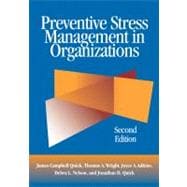
Note: Supplemental materials are not guaranteed with Rental or Used book purchases.
Purchase Benefits
What is included with this book?
| Preface | p. xi |
| Introduction | p. 3 |
| Stress in Organizations | p. 11 |
| What is Stress? | p. 12 |
| The Stress Concept: A Historical View | p. 16 |
| Stress in Organizations | p. 19 |
| The Power of Prevention | p. 22 |
| Preventive Stress Management in Organizations | p. 23 |
| Stress: Challenge, Threat, or Hindrance? | p. 25 |
| Organizational Demands, Risks, and Protective Factors | p. 27 |
| Physical Environment | p. 29 |
| Technology-Crosscutting Effects | p. 31 |
| Functional Environment-The Content of Work | p. 33 |
| Contextual Environment-Organizational Culture and Relationships at Work | p. 38 |
| Individual Differences in the Stress Response | p. 43 |
| Cognitive Appraisal | p. 44 |
| Types and Levels of Stress | p. 45 |
| Individual Differences in the Stress Process | p. 46 |
| Individual Consequences of Stress | p. 59 |
| Behavioral Distress | p. 61 |
| Psychological Distress | p. 63 |
| Medical Distress | p. 68 |
| Eustress, Hope, and Optimism | p. 72 |
| Organizational Consequences of Stress | p. 73 |
| Organizational Health | p. 74 |
| Costs of Organizational Distress | p. 76 |
| Positive Paths to Psychological Health and Eustress in Organizations | p. 85 |
| Stress Measurement, Assessment, and Surveillance | p. 87 |
| Clearly Articulate a Vision | p. 89 |
| Select an Assessment Strategy, Measures, and Techniques | p. 90 |
| Establish a Baseline | p. 97 |
| Individualized Assessment | p. 99 |
| Preventive Stress Management: Principles, Theory, and Practice | p. 103 |
| Guiding Principles of Preventive Stress Management | p. 103 |
| The Theory of Preventive Stress Management | p. 107 |
| The Practice of Preventive Stress Management | p. 108 |
| Organizational Prevention: Protecting People | p. 115 |
| Organizational Health Center | p. 117 |
| Job Redesign | p. 119 |
| Career Development | p. 123 |
| Ergonomic Office Design | p. 126 |
| Work-Life Programs | p. 128 |
| Organizational Prevention: Nurturing Relationships | p. 131 |
| Resonant Leadership | p. 132 |
| Goal Setting | p. 135 |
| Social Support | p. 138 |
| Teamwork | p. 141 |
| Diversity Programs | p. 144 |
| Primary Prevention for Individuals: Managing and Coping With Stressors | p. 147 |
| Managing Personal Perceptions of Stress | p. 148 |
| Managing the Personal Work Environment | p. 156 |
| Managing Lifestyle | p. 161 |
| Secondary Prevention for Individuals: Modifying Responses to Inevitable Demands | p. 165 |
| Relaxation Training | p. 166 |
| Spirituality and Faith | p. 171 |
| Emotional Outlets | p. 173 |
| Physical Fitness | p. 176 |
| Nutrition | p. 180 |
| Tertiary Prevention for Individuals: Healing the Wounds | p. 183 |
| Emotional Health in the Workplace | p. 185 |
| Psychological Interventions | p. 186 |
| Health Care | p. 191 |
| Traumatic Workplace Events | p. 193 |
| Creating a Personal Preventive Stress Management Plan | p. 193 |
| Preventive Stress Management: Challenge and Opportunity | p. 199 |
| A Proactive Agenda for Preventive Stress Management | p. 200 |
| Looking Within: Be the Leader | p. 203 |
| References | p. 205 |
| Index | p. 231 |
| About the Authors | p. 245 |
| Table of Contents provided by Ingram. All Rights Reserved. |
The New copy of this book will include any supplemental materials advertised. Please check the title of the book to determine if it should include any access cards, study guides, lab manuals, CDs, etc.
The Used, Rental and eBook copies of this book are not guaranteed to include any supplemental materials. Typically, only the book itself is included. This is true even if the title states it includes any access cards, study guides, lab manuals, CDs, etc.